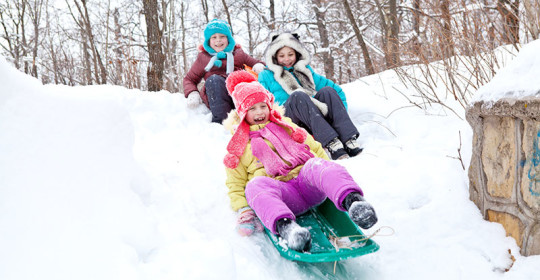
Be Prepared to Stay Safe and Healthy in Winter

Winter storms and cold temperatures can be hazardous. Stay safe and healthy by planning ahead. Prepare your home and cars. Prepare for power outages and outdoor activity. Check on older adults.
Hypothermia
When exposed to cold temperatures, your body begins to lose heat faster than it can be produced. The result is hypothermia, or abnormally low body temperature. Body temperature that is too low affects the brain, making the victim unable to think clearly or move well. This makes hypothermia particularly dangerous because a person may not know it is happening and won’t be able to do anything about it.
Hypothermia occurs most commonly at very cold environmental temperatures, but can occur even at cool temperatures (above 40°F) if a person becomes chilled from rain, sweat, or submersion in cold water.
Frostbite Injury
Frostbite is an injury to the body that is caused by freezing. Frostbite causes a loss of feeling and color in affected areas. It most often affects the nose, ears, cheeks, chin, fingers, or toes. Frostbite can permanently damage the body, and severe cases can lead to amputation.
Infants & Older People
Infants lose body heat more easily than adults; additionally, infants can’t make enough body heat by shivering. Infants less than one year old should never sleep in a cold room. Provide warm clothing and a blanket for infants and try to maintain a warm indoor temperature. If the temperature cannot be maintained, make temporary arrangements to stay elsewhere. In an emergency, you can keep an infant warm using your own body heat. If you must sleep, take precautions to prevent rolling on the baby. Pillows and other soft bedding can also present a risk of smothering; remove them from the area near the baby.
Older adults often make less body heat because of a slower metabolism and less physical activity. If you are more than 65 years of age, check the temperature in your home often during severely cold weather. Also, check on elderly friends and neighbors frequently to ensure that their homes are adequately heated.
Read More:
- Severe Winter Weather FAQs: http://emergency.cdc.gov/disasters/winter/faq.asp
- Winter Outdoor Safety: http://www.emergency.cdc.gov/disasters/winter/duringstorm/outdoorsafety.asp
- Winter Emergency Checklist: http://emergency.cdc.gov/disasters/winter/beforestorm/supplylists.asp


Most Commented